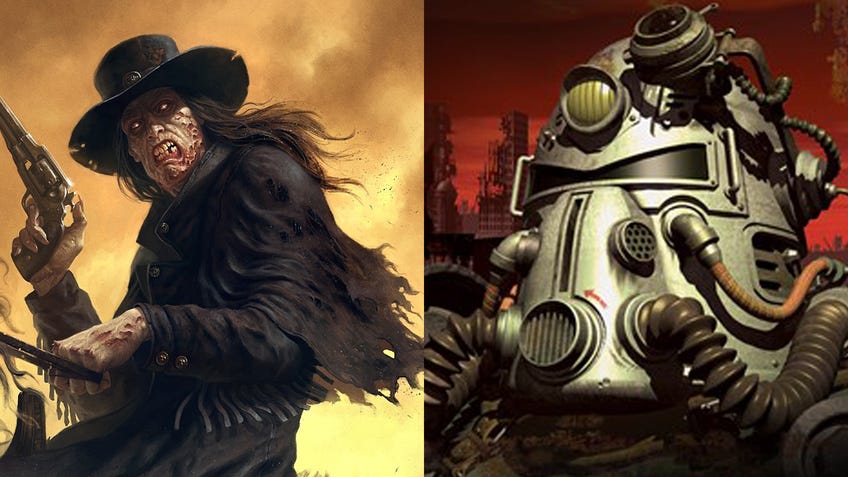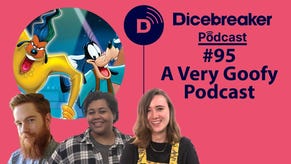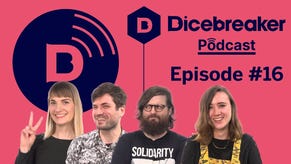Miss the dark, brutal atmosphere of old-school Fallout? Weird-West tabletop RPG Deadlands is its ideal successor
Different eras, same darkness.
Today’s Fallout is not the same as the original Fallout. The brutal and dirty introspective world of the first Fallout video game has since been buffed and shined into an impressive-looking theme park, one that features all the recognisable elements of the series - freshly adapted as a big-budget Amazon TV show - but lacks the real purpose behind them.
One of the big appeals of Fallout is its twist on the post-apocalyptic formula: positing that the political tensions of the late 1940s and ‘50s continued for several decades and eventually boiled over into all-out nuclear warfare in 2077. It would make sense that if human society, as we know it, ended in a certain era, then the culture of that era would continue to remain relevant for years to come simply because it's all that’s left. This is why the world of Fallout features the aesthetics of the ‘40s and ‘50s mixed in with speculative stuff like robots, super-mutants and laser guns.
The world of the original Fallout isn’t just bleak because of the terrifying Deathclaws, radioactive dead zones and roaming gangs of Raiders. It also remains a victim of the pro-capitalist, xenophobic and pro-individualism of the last major form of society that ever existed. Junktown’s exploitative casino owner Gizmo takes advantage of the locals’ reliance on gambling and attempts to assassinate one of the few people to oppose him, Sheriff Killian Darkwater, in pursuit of upholding his personal wealth. Meanwhile, the game’s main antagonist, The Master, kidnaps and performs unethical experiments on random innocents because of a desire to eliminate differences, believing that homogenising culture would end all conflict.
The iconography of smiling Vault-Tec mascot Vault Boy, the upbeat jazz and rock tunes, and space-age aesthetics don’t just exist as a garish contrast to the dirt and grime of the Wasteland; they’re also tools used to explore the darker aspects of popular US culture. This feels like something that later entries in the series softened on, swapping the sinister moral implications of Fallout’s world and the players’ choices within it in favour of a kooky open-world filled with cool weapons to shoot at cool monsters.
While the modern Fallout entries are closer to first-person looter-shooters such as the Borderlands series, the first two mainline Fallout titles are isometric roleplaying games closer to the likes of Baldur’s Gate that were designed to make players feel vulnerable in the face of the terrible dangers of the wasteland. Whereas Fallout 4 has players stepping into a suit of power armour within the first few hours, the player character in the original Fallout has the potential to die from being attacked by a rat in the first playable section of the game.
As in Fallout, the world of Deadlands is one that features supernatural, fictitious elements that pose dangers to its characters.
This harsher, slower approach to gameplay forces players to think carefully about their next move - not just from a strategic sense, but also a moral one. Sometimes the kindest choice is also the hardest one. The original Fallout’s gameplay is far from perfect; the esoteric character-building system that punishes anyone who doesn’t know exactly what they’re doing is especially egregious. However, it does better illustrate the harsh nature of an America that prioritises capitalism and individualism over community and human compassion than the light and breezy gameplay of the likes of Fallout 4.
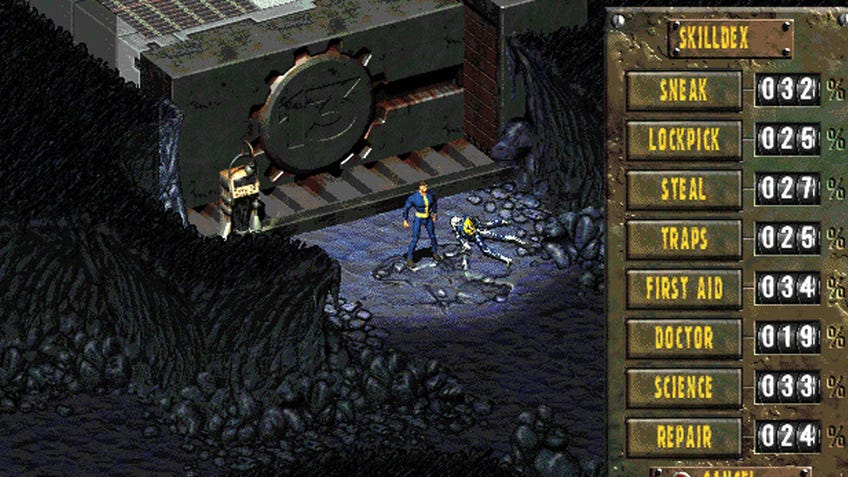
Fallout doesn’t have a monopoly over sci-fi-infused period pieces that play around with alternate historical timelines. Deadlands: The Weird West is a Wild West-themed tabletop roleplaying game set in an alternate version of the late 19th century. Similar to the emergence of ghouls, mutants and robots in the dust of Fallout’s nuclear apocalypse, in Deadlands an event called The Reckoning results in the human world being invaded by supernatural entities called Reckoners. These entities seek to turn the Earth into a haunted wasteland populated only by the likes of monsters, zombies and other hellish creatures - kind of like Fallout’s now desiccated America. The Reckoning happens as a result of a tribe of Indigenous Americans going to desperate lengths to protect their land from the invasion of White colonists, hoping that the powerful beings occupying another realm will aid them in saving their homes and families.
Though the Reckoners are generally hostile to humans, they’re more than willing to take advantage of their worst traits. Despite the US government’s attempts to keep the existence and actions of the Reckoners under wraps from the general public - in the hopes that people will continue to operate within the accepted systems of American society - entire towns are terrorised by eldritch beings and innocent people are murdered by monsters. Meanwhile, businesses use the newly-discovered resource of Ghost Rock to fuel their profits thanks to the impressive power it grants various machines such as trains and even futuristic technologies - all of which is unregulated and thoroughly exploited.
Just like the original Fallout’s inclusion of science-fiction elements, the scary supernatural aspects of Deadlands emphasise horrors of its chosen historical period.
As in Fallout, the world of Deadlands is one that features supernatural, fictitious elements that pose dangers to its characters, but it’s the capitalistic, individualistic and racist aspects of the late 19th-century United States that serve to enable its most threatening aspects. This is a world where the blight of the Native American people directly leads to The Reckoning, where the slavery of African-American people still results in a bloody civil war and the government sends federal agents to investigate and clean up the messes it refuses to publicly acknowledge.
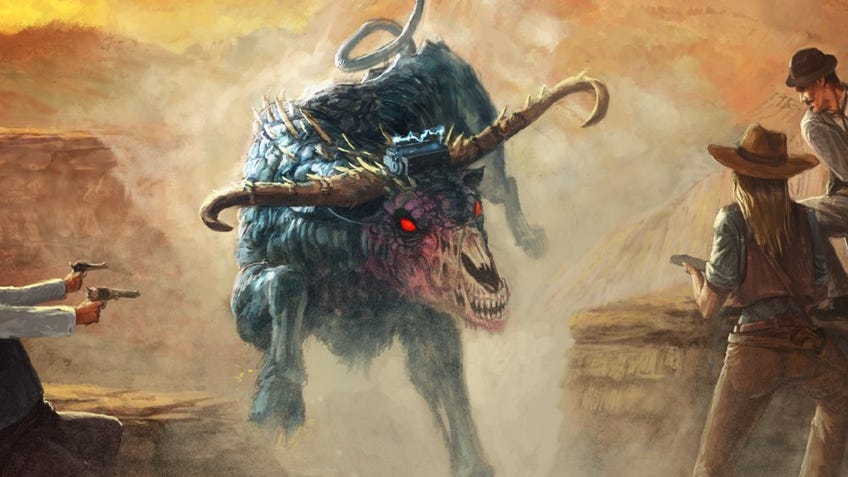
Like Fallout’s balancing of satirical humour amid the horrors, there are opportunities for players to experience more playful campaigns that focus on the lighter elements of the Weird West setting. However, it’s in the horror genre that Deadlands really thrives; like any good horror roleplaying game, characters are under a near constant threat of danger. Though players are free to create characters who have the ability to manipulate the supernatural forces around them - such as magical Hucksters, spiritually-driven Shaman or scientists who have harness the power of Ghost Rock - there’s also the option to make a fairly ordinary person who has been thrust into a world in which they are clearly outmatched, similar to Fallout’s Vault Dweller protagonists.
Even more supernaturally-inclined characters will regularly find themselves in situations where they’re dealing with forces they cannot contend with, or are made to make difficult decisions in the name of survival. As in Fallout, characters in Deadlands can get to the point where they’re powerful enough to go toe-to-toe with even some of the most fearsome of foes, but it’ll take players a good chunk of time to get there and there will be plenty of hardships along the way. Just like the original Fallout’s inclusion of science-fiction elements, the scary supernatural aspects of Deadlands emphasise horrors of its chosen historical period - with the player characters fighting against a seemingly unbeatable form of corruption caused by the sins of their founding fathers and abetted by their own leaders.
Though Fallout 3 and Fallout 4 might be the most popular entries in the series, particularly in the wake of the recent Amazon Fallout TV show, the original Fallout is arguably where the franchise was at its most creatively raw. Fallout: New Vegas is praised for pulling off a balancing act between its politically-driven writing and more accessible first-person gameplay, but there’s something about the first Fallout game that remains enduringly uncompromising in its approach to the concept of a post-apocalyptic America haunted by the success and brutality of its past. In the wake of the loss of Fallout’s initially steadfast and undiluted creative vision, Deadlands provides a roleplaying experience that scratches that same neglected itch of an unflinching approach to the wrongs of the past and the present through an imaginative lens.
Buy Deadlands: The Weird West core rulebook from Pinnacle Entertainment
